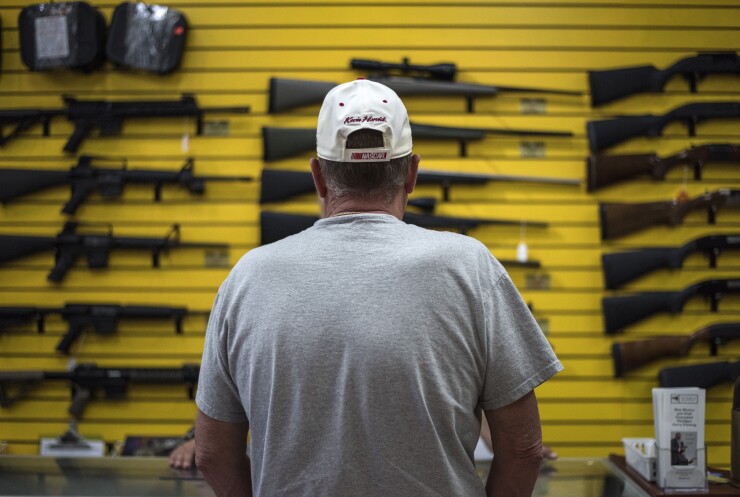A month after the mass shooting at a high school in Florida, and days before a national march against gun violence, Citigroup became the first big bank to impose restrictions on what kinds of firearms sellers it will do business with.
So the natural question is: Will other banks feel pressure to follow its lead on this divisive issue?
In a policy announced Thursday, Citi said it would require all of its customers — from commercial borrowers to cobranded card clients — to adhere to a number of principles restricting gun sales, including banning the sale of bump stocks and ensuring background checks are performed before firearms are sold.
The move shows Citi taking a bold step into the middle of an intense social debate over how to prevent gun violence — and how to stem the tragic string of school shootings. It is unclear how its peers will respond.
After the announcement, American Banker reached out to a handful big banks. JPMorgan Chase, Bank of America and Capital One Financial did not respond. U.S. Bancorp declined to comment. Wells Fargo reiterated its position that gun reform should be led by elected officials.
PNC Financial Services Group adopted guidance in 2013 that discourages new loans to gun manufacturers, a spokeswoman said. PNC "has very limited exposure to clients that manufacture AR-15-style rifles," she said. "We are continuing to consider these issues."

In a memo to employees Thursday, Citi CEO Michael Corbat urged his peers to follow suit.
“We know that our efforts cannot lead to real change unless we work with others,” Corbat said in the memo. “To that end, we are initiating a dialogue within the financial services industry and with other stakeholders to understand whether there are additional technology solutions or voluntary standards that can be enacted.”
Public relations and crisis management experts said the pressure on the other banks is coming from all directions.
Airlines and others took some heat for being early movers, but now
“I think that other banks may follow suit, and I think you’re going to see it spread to other industries,” Grabowski said. “There’s too many of them now for the [National Rifle Association] to strike back at all of them.”
Follow-on banks will command less attention, another expert said.
“You might see a couple of banks follow Citi and do this,” said William Mills III, CEO of the William Mills Agency, an Atlanta public relations firm that advises financial services companies. “But from a media relations standpoint, Citi has already gotten the major impact from this initiative. Anything that other financial institutions may do will be much more low-key.”
In the weeks after the fatal shootings of 17 students and staff members at Marjory Stoneman Douglas High School in Parkland, Fla. — and the student-led gun-control protests that followed — the banking industry has come under pressure restrict financial services for gunmakers.
Days after the shooting in Florida,
Meanwhile, Wells Fargo — the go-to bank for gunmakers and their lobbying groups — said in a
“Any solutions on how to address this epidemic will be complicated,” the San Francisco company told Bloomberg. “This is why our company believes the best way to make progress on these issues is through the political and legislative process.”
Under its new policy, Citi said it would require its business customers to follow three primary rules. They must not sell firearms to someone who hasn’t passed a background check. They must also restrict the sale of guns to people who are under 21 years old, and they must not sell bump stocks or high-capacity magazines.
Citi has “few” relationships with companies that manufacture firearms,” Corbat said in the memo, though he did not provide details. Citi has begun working with those companies, to understand what products they make and the retailers they work with, and will also apply more rigorous screening to future business customers, he said.
For customers who choose not to follow the new guidelines, Citi will work with them to “transition their business away” to other financial services providers, according to Corbat.
The policy is notable, in part, in that it restricts firearm sales, while also sidestepping a topic that has sparked a debate within the banking industry itself: whether financial companies should restrict gunmakers’ access to the payments system.
In the memo, Corbat acknowledged that the move — made two days before
“I know that some will find our policy too strict while others will find it too lenient,” Corbat said. “We don’t have the perfect solution to supporting our Constitution while keeping our children and grandchildren safe.”
Still, Corbat described it as a first step in addressing an issue that is sure to be debated in the public and private sectors for years to come.
“Best practices are going to continue to change, and we understand the limitations of our efforts,” Corbat said. “But we shouldn’t let that stop us from doing our part.”





